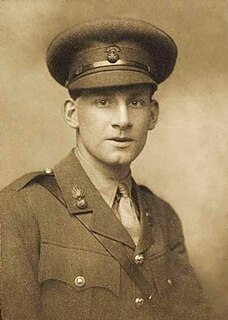
Siegfried Loraine Sassoon was an English war poet, writer, and soldier. Decorated for bravery on the Western Front, he became one of the leading poets of the First World War. His poetry both described the horrors of the trenches and satirised the patriotic pretensions of those who, in Sassoon's view, were responsible for a jingoism-fuelled war. Sassoon became a focal point for dissent within the armed forces when he made a lone protest against the continuation of the war in his "Soldier's Declaration" of 1917, culminating in his admission to a military psychiatric hospital; this resulted in his forming a friendship with Wilfred Owen, who was greatly influenced by him. Sassoon later won acclaim for his prose work, notably his three-volume fictionalised autobiography, collectively known as the "Sherston trilogy".
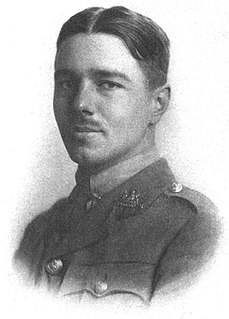
Wilfred Edward Salter Owen MC was an English poet and soldier. He was one of the leading poets of the First World War. His war poetry on the horrors of trenches and gas warfare was much influenced by his mentor Siegfried Sassoon and stood in contrast to the public perception of war at the time and to the confidently patriotic verse written by earlier war poets such as Rupert Brooke. Among his best-known works – most of which were published posthumously – are "Dulce et Decorum est", "Insensibility", "Anthem for Doomed Youth", "Futility", "Spring Offensive" and "Strange Meeting".

Regeneration is a historical and anti-war novel by Pat Barker, first published in 1991. The novel was a Booker Prize nominee and was described by the New York Times Book Review as one of the four best novels of the year in its year of publication. It is the first of three novels in the Regeneration Trilogy of novels on the First World War, the other two being The Eye in the Door and The Ghost Road, which won the Booker Prize in 1995. The novel was adapted into a film by the same name in 1997 by Scottish film director Gillies MacKinnon and starring Jonathan Pryce as Rivers, James Wilby as Sassoon and Jonny Lee Miller as Prior. The film was successful in the UK and Canada, receiving nominations for a number of awards.
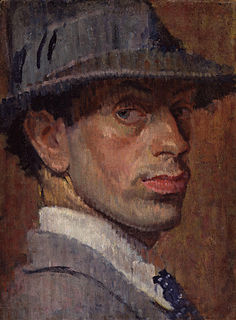
Isaac Rosenberg was an English poet and artist. His Poems from the Trenches are recognized as some of the most outstanding poetry written during the First World War.
This article contains information about the literary events and publications of 1918.

"Anthem for Doomed Youth" is a poem written in 1917 by Wilfred Owen. It incorporates the theme of the horror of war.
Not About Heroes is a drama by Stephen MacDonald about the real-life relationship between the poets Wilfred Owen and Siegfried Sassoon first performed in 1982 at the Edinburgh Festival in Edinburgh, Scotland.

Literature about World War I is generally thought to include poems, novels and drama; diaries, letters, and memoirs are often included in this category as well. Although the canon continues to be challenged, the texts most frequently taught in schools and universities are lyrics by Siegfried Sassoon and Wilfred Owen; poems by Ivor Gurney, Edward Thomas, Charles Sorley, David Jones and Isaac Rosenberg are also widely anthologised. Many of the works during and about the war were written by men because of the war's intense demand on the young men of that generation; however, a number of women created literature about the war, often observing the effects of the war on soldiers, domestic spaces, and the homefront more generally.
"Dulce et Decorum est" is a poem written by Wilfred Owen during World War I, and published posthumously in 1920. The Latin title is taken from Ode 3.2 (Valor) of the Roman poet Horace and means "it is sweet and fitting". It is followed by pro patria mori, which means "to die for one's country". One of Owen's most renowned works, the poem is known for its horrific imagery and condemnation of war. It was drafted at Craiglockhart in the first half of October 1917 and later revised, probably at Scarborough but possibly Ripon, between January and March 1918. The earliest surviving manuscript is dated 8 October 1917 and addressed to his mother, Susan Owen, with the message: "Here is a gas poem done yesterday ."

Craiglockhart Hydropathic, now a part of Edinburgh Napier University and known as Craiglockhart Campus, is a building with surrounding grounds in Craiglockhart, Edinburgh, Scotland. As part of a large extension programme by the university in the early 2000s the original building and surrounding campus underwent significant restoration and modernisation as a result many of the original interior features of the building are no longer visible. The exterior of the building has been preserved.

A war poet is a poet who participates in a war and writes about their experiences, or a non-combatant who writes poems about war. While the term is applied especially to those who served during the First World War, the term can be applied to a poet of any nationality writing about any war, including Homer's Iliad, from around the 8th century BC as well as poetry of the American Civil War, the Spanish Civil War, the Crimean War and other wars.
Jessie Pope was an English poet, writer, and journalist, who remains best known for her patriotic, motivational poems published during World War I. Wilfred Owen wrote his 1917 poem Dulce et Decorum est to Pope, whose literary reputation has faded into relative obscurity as those of war poets such as Owen and Siegfried Sassoon have grown.
Nationality words link to articles with information on the nation's poetry or literature.

Regeneration is a 1997 British film, an adaptation of the 1991 novel of the same name by Pat Barker. The film is directed by Gillies MacKinnon. It was released as Behind the Lines in the US in 1998. The film follows the stories of a number of Officers of the British Army during World War I who are brought together in Craiglockhart War Hospital where they are treated for various traumas. It features the story of Siegfried Sassoon, his open letter reprinted in The Times criticising the conduct of the war and his return to the front.
"Insensibility" is a poem written by Wilfred Owen during the First World War which explores the effect of warfare on soldiers.

"The Dead-Beat" is a poem by Wilfred Owen. It deals with the atrocities of World War I.
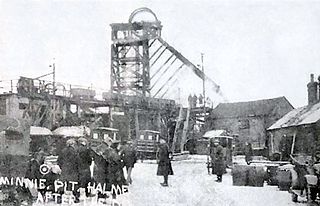
"Miners" is a poem by Wilfred Owen. He wrote the poem in Scarborough in January 1918, a few weeks after leaving Craiglockhart War Hospital where he had been recovering from shell-shock. Owen wrote the poem in direct response to the Minnie Pit Disaster in which 156 people died.
Strange Meetings: The Lives of the Poets of the Great War is a non-fiction book by Harry Ricketts, first published by Chatto & Windus in 2010. The book is a kind of collective biography of the major poets of World War I, in the form of documented or speculated meetings between the individual poets, covering a period between 1914 and 1964. The poets whose careers are described include Vera Brittain, Rupert Brooke, Robert Graves, Ivor Gurney, David Jones, Robert Nichols, Wilfred Owen, Isaac Rosenberg, Siegfried Sassoon and Edward Thomas. The title of the book is a variation on the title of "Strange Meeting", a poem by Wilfred Owen, which itself is taken from a phrase in Shelley's The Revolt of Islam.
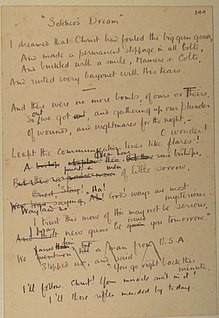
Soldier's Dream is a poem written by English war poet Wilfred Owen. It was written in October 1917 in Craiglockhart, a suburb in the south-west of Edinburgh (Scotland), while the author was recovering from shell shock in the trenches, inflicted during World War I. The poet died one week before the Armistice of Compiègne, which ended the conflict on the Western Front.

Poems was a quarto volume of poetry by Wilfred Owen published posthumously by Chatto and Windus in 1920. Owen had been killed on 4 November 1918. It has been described as "perhaps the finest volume of anti-war poetry to emerge from the War".
3. Theatre cloud. (2014). Sassoon and Owen: A meeting that changed the course of literature. Retrieved from http://www.theatrecloud.com/news/sassoon-and-owen-a-meeting-that-changed-the-course-of-literature










